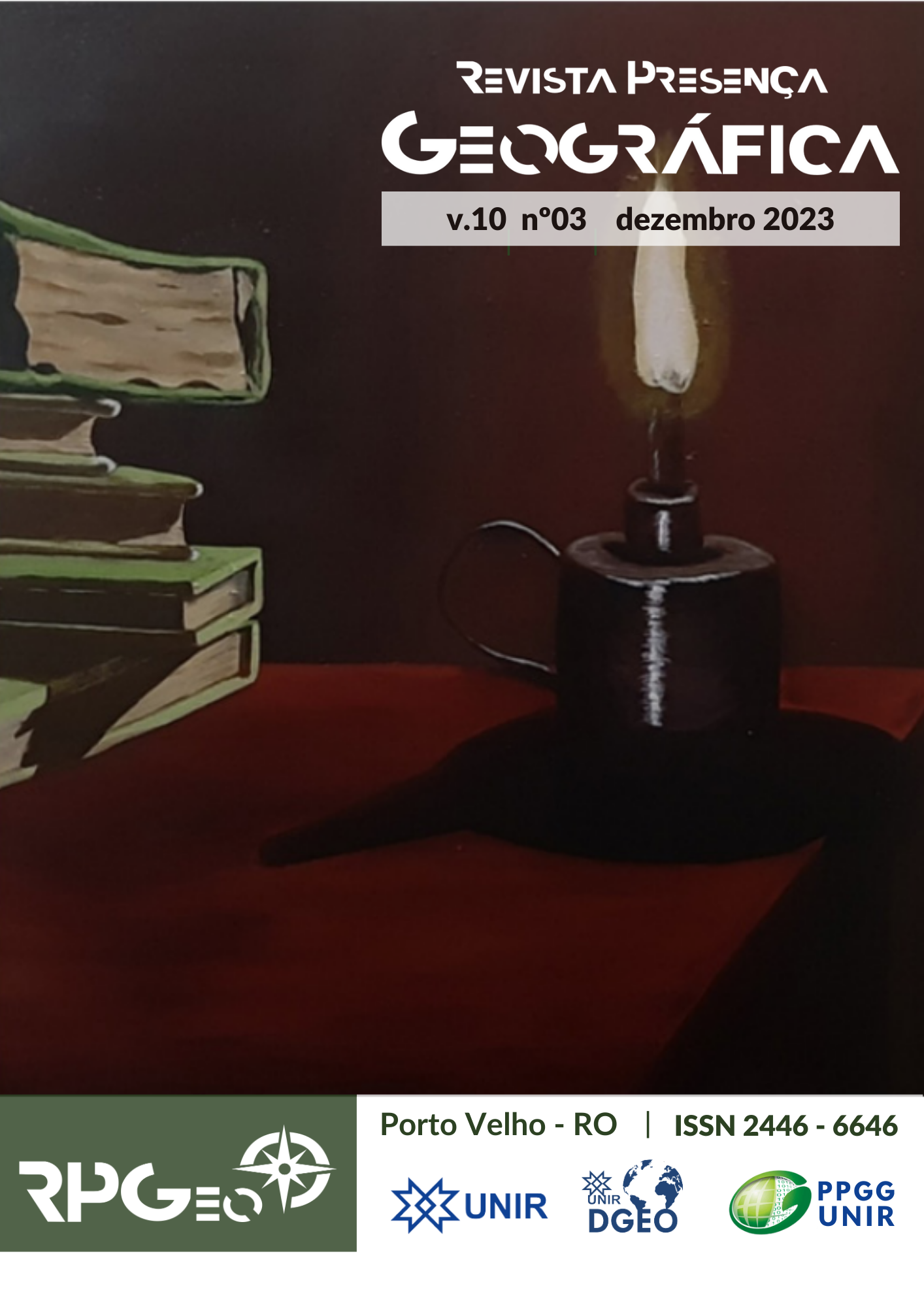BUEN VIVIR AND UBUNTU: THE INTERSECTIONALITY OF AFROPERSPECTIVES AND AMERINDIAN THOUGHT
DOI:
https://doi.org/10.36026/rpgeo.v10i3.8133Keywords:
Palavras-chave, Bem Viver; Ubuntu; Territorialidades.Abstract
This article proposes a theoretically based study that projects the concept of Good Living and Ubuntu for Afro-Amerindian peoples in the field of Cultural Geography. It discusses the similarity of the perspectives of Afro and indigenous collective groups that will be the common thread for the proposal to expand the understanding of Good Living and Ubuntu with a focus on ancestral territoriality. The article seeks to answer the problem: how can Afro-diaspora and Amerindian thought contribute with their experiences of Good Living and Ubuntu to think about notions of territoriality? It uses a bibliographical review on the concept of Good Living and also Ubuntu, as well as authorial works, books, theses, and dissertations by African and indigenous authors who deal with their worldviews, with a focus on territorialities. It is possible that the hegemonic theoretical frameworks of Eurocentric Geography impede, to some extent, the possibility of thinking about other worldviews, because the first notions deal with only one type of human nature. The Anthropocene suffers from an epistemic crisis, as Afro-Amerindian peoples constantly occupy spaces for debate and project their philosophies in confronting the Western capitalist model and its epistemic borders based on variations in human nature. Such Western thinking has led the planet to metabolize nature into merchandise, reducing life on earth to a civilization model. The populations that inhabit Abya Yala, on the contrary, with some variation, have their relationships with their specialities historically based on the biointeraction of the human species with their natural environment and, therefore, define their ways of life in dialogue with the visible and invisible beings in a collaborative process, where Nature has its humanities, in the plural.
References
CLAVAL, Paul. A Contribuição Francesa ao Desenvolvimento da Abordagem Cultural na Geografia. In: CORRÊA, R. L.; ROSENDAHL, Zeny (Org.). Introdução à Geografia Cultural 2. ed. Rio de Janeiro: Bertrand Brasil, 2007. p. 147-16
KRENAK. Ailton. Ecologia Política. Ethnoscientia 3 (n.2 Especial): 1-2, 2018.
KRENAK. Ailton. O amanhã não está à venda. São Paulo: Editora SCHWARCZ S.A., 2020a.
KRENAK. Ailton. Caminhos para a cultura do Bem Viver. Organização: Bruno Maia. Escola Parque do Rio de Janeiro. 2020b.
KOPENAWA; Davi; ALBERT, Bruce. A queda do céu: palavras de um xamã Yanomami. São Paulo – SP: Companhia da Letras, 2015.
LOPES, Nei. Filosofias africanas: uma introdução / Nei Lopes, Luiz Antonio – Rio de Janeiro: Civilização Brasileira, 2021.
MALOMALO, Bas’ilele. Filosofia Ubutu: valores civilizatórios das ações afirmativas para o desenvolvimento. Curitiba, PR: CRV, 2014.
PORTO-GONÇALVES, Carlos Walter. A globalização da natureza e a natureza da globalização. Rio e Janeiro: Civilização Brasileira, 2006.
PORTO-GONÇALVES, Carlos Walter. Entre América e Abya Yala: tensões de territorialidades. Desenvolvimento e Meio ambientes, n. 20, p. 25-30, jul./dez. 2009. Editora UFPR.
PORTILLA. Miguel Leon. A conquista da América Latina Vista pelos índios: relatos Astecas, Maias e Incas. 2ª Ed. Petrópolis (RJ): Editora Vozes, 1985.
SANTOS, Antônio Bispo. Colonização, quilombos: modos e significações. Brasília: UNB, 2015.
SANTOS, Antônio Bispo. KRENAK, Ailton. Ciclo Outras Economias - Cosmologias do dinheiro. Nego Bispo e Ailton Krenak. Disponível em: https://www.youtube.com/watch?v=ueQAV_4fWbY&t=2639s Acesso em 26 de agosto de 2023.
RATTS, Alex. A questão étnica e/ou racial no espaço: a diferença no território e a geografia. Boletim Paulista de Geografia, nº 104, jul.-dez. 2020.
Downloads
Published
Issue
Section
License
Copyright (c) 2023 Simone Rodrigues dos Santos Gomes

This work is licensed under a Creative Commons Attribution-NonCommercial-NoDerivatives 4.0 International License.
This work is licensed under Creative Commons Attribution-NonCommercial-NoDerivatives 4.0 Internacional license.
Authors who publish in this journal agree to the following terms:
- Authors retain the copyright and grant the journal the right to first publication, with the work simultane ously licensed under Creative Commons Attribution-NonCommercial-NoDerivatives 4.0 Internacional License that allows the sharing of the work with acknowledgment of authorship and initial publication in this journal.
- Authors are authorized to assume additional contracts separately, for non-exclusive distribution of the version of the work published in this journal (ex, publishing in institutional repository or as a book chapter), with acknowledgment of authorship and initial publication in this journal.
- Authors are allowed and encouraged to publish and distribute their work online (ex.: in institutional repositories or on their personal page) at any point before or during the editorial process, as this can generate productive changes, as well as increase the impact and the citation of the published work (See The Free Acess Policy).







